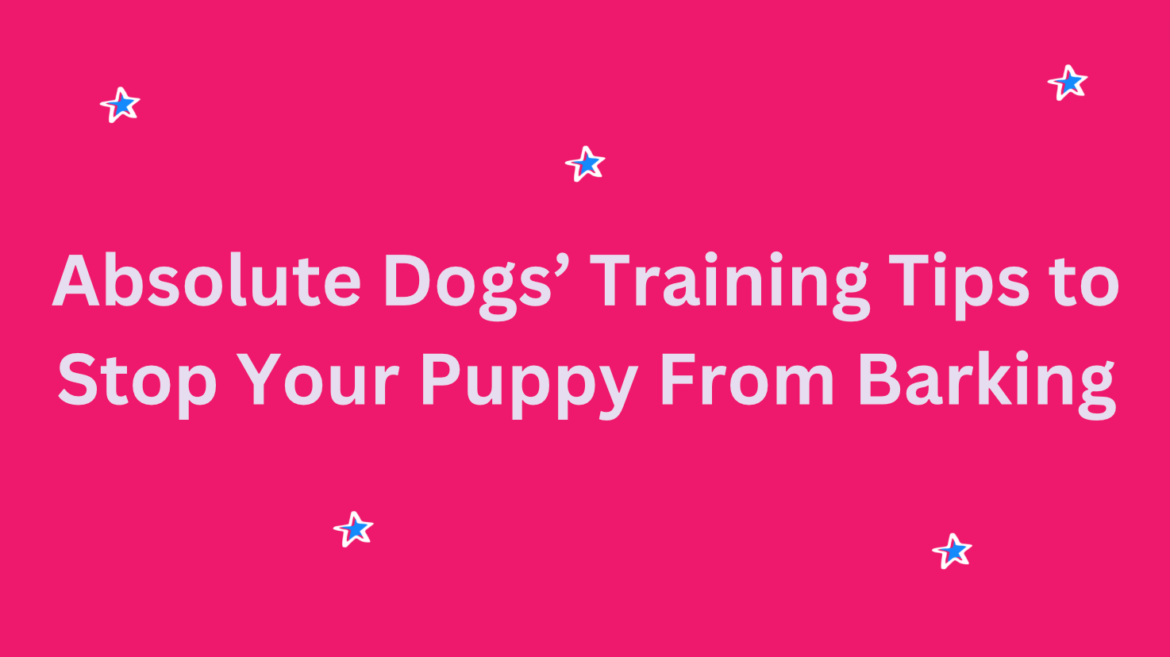Many dog owners feel unsure about how to stop their puppy from barking excessively. Although this challenge can feel overwhelming, Absolute Dogs offers several training videos and courses showing you how to calm your puppy and train them out of barking unnecessarily.
Here, the Absolute Dogs training pros explain the possible reasons behind your puppy’s barking and the different types of barking your puppy may exhibit. They also share strategies to help you train your puppy to stop barking through fun but calm games.
What Is the Difference Between Nuisance and Anticipated Barking?
Every dog owner has a different idea of what constitutes nuisance barking and what constitutes desirable/anticipated barking.
For example, some owners like their dogs to let them know when a delivery person arrives or when something suspicious could be happening outside. Other owners prefer their dogs to be quiet, especially if the noise level can affect neighbours.
The more your puppy practises scenarios where they do or don’t bark, the more they will establish their behaviour in similar situations.
It’s important to be consistent about encouraging and discouraging barking. If you encourage barking in one scenario but discourage it next time, your puppy will be confused about when it is and isn’t a good time to bark.
However, it can be difficult to train a puppy to bark in some scenarios but not others. Absolute Dogs recommends that owners decide whether they are happy for their puppy to bark. If not, they can train their puppy to be calm with Absolute Dogs’ array of games.
Why Is Your Puppy Barking?
Before you can train your puppy not to bark, it’s important to understand why they’re barking. Some dogs are more naturally inclined to bark than others. They may have been expected to bark as part of their breeding, perhaps if they were bred for herding livestock or protecting their home. Others may have barking in their genetic code.
It’s easy to think that a puppy is being disobedient or stubborn when they bark. However, a puppy is a dog, not a human. Barking is a symptom of their emotional response. When your puppy barks, they’re trying to communicate with you. Observe your puppy and take note of their actions. This should give you some big clues into the message they’re trying to communicate.
The solution is never to stop your puppy from communicating, whether they’re barking, growling, whining, or howling. Instead, the solution is to address the cause of this communication. From here, you can play games that help your puppy overcome the challenge behind the barking.
What Are the Different Types of Barking?
There are different types of barking that you might recognise in your puppy. Each comes with signs that can help you work out why your puppy is barking.
Here are six of the most common types of barking.
1. Excitement Or Frustration Barking
Your puppy might bark when you’re playing with them, especially when they think something amazing is about to happen. In this case, your puppy might simply be excited.
However, if your puppy jumps towards you while barking, they may be frustrated that this amazing thing hasn’t happened yet. Alternatively, they may not understand your actions and be unsure of what’s happening.
Play aside, your puppy might bark in excitement or frustration during training or when they can’t access something because it’s behind a barrier. Train your puppy out of barking by not allowing access beyond the barrier while they’re barking.
Excited or frustrated barking is often higher pitched, and your puppy may whine too.
2. Anxious Barking
Your puppy may bark or howl when you leave if they are experiencing separation-related struggles. In this case, playing games that foster calmness and independence will be helpful. Start this training as soon as possible so your puppy doesn’t rehearse anxious barking when you leave them alone.
3. Fear-Based Barking
Your puppy may bark if they are scared. This barking may seem like frustration barking, but it’s deeper and more fearful. Your puppy is also likely to lunge or move away from the source of fear. This is because most puppies either try to escape or tackle the source of fear head-on. If your puppy displays fearful behaviour, play games that help them develop their confidence and optimism.
4. Attention-Seeking Barking
Your puppy may bark in the hope of getting attention, especially if they’ve already been barking out of frustration.
Frustration barking often progresses to attention-seeking barking when the owner reinforces the initial barking. You might respond to the frustration barking in a way that encourages your puppy to continue seeking attention. For example, your puppy may perceive you telling them to quiet down as the attention they want and then continue to bark.
5. Boredom Barking
Your puppy may bark if they are bored and understimulated. Boredom barking may appear disjointed or like there isn’t an intention behind it. Your puppy may feel bored if left in a confined space, such as a garden.
6. Barking In a Crate
If your puppy barks as soon as you put them in their crate, they may need a few minutes to settle. Many puppies fight feeling sleepy when their owners put them in a crate or exercise pen to rest.
If your puppy barks for longer than 5-10 minutes, they may need to toilet, self-soothe with some mental enrichment (try a stuffed toy or calm mat), or play a low-energy game to quiet their body and mind.
How Can You Reduce Your Puppy’s Barking?
Absolute Dogs recommends three types of games to reduce your puppy’s barking and foster calmness.
1. Non-Event Training Games
When you know which scenarios trigger your puppy’s barking, you can mark these scenarios as non-events. When these events come up, reward your puppy for acknowledging them without making a fuss. Make it clear that these scenarios are no big deal. They may include your puppy seeing:
- Other dogs or people (perhaps when on a walk or in a vehicle).
- Other dogs or people on the television.
- Animals and insects.
- Bags or moving objects.
- Items that have moved to a different location.
- You or other people moving quickly.
If possible, reward your puppy before they bark to prevent them from barking at all. You’ll also help your puppy build their confidence and feel safe in the environment.
2. The Attention Noise Game
Playing the Attention Noise game is a great way to interrupt undesirable behaviour like barking, especially during a training session. You’ll need an upbeat, fun attention noise to play, perhaps a kissing sound or a “pup, pup, pup” chant.
Hold a piece of food at your puppy’s mouth and guide them so they turn away from you to follow the food. Toss the food so it lands a short distance away where your puppy can see it. Aim just below your puppy’s chin or a little further away if they’re well coordinated and can track the food.
When your puppy has eaten the food, make your attention noise. This should prompt them to turn back to you. Say “yes” and reward your puppy for returning to you. If they move slowly, continue to cheer them until they make it back. From here, you can redirect to a game that promotes calmness.
If your puppy is barking and the attention noise isn’t working, move away from the distraction your puppy is barking at. Your puppy may be able to focus on you if you are further away. Some puppies respond well when their owner is 10 feet away. Others focus better when their owner is 50 feet away.
3. Arousal Up, Arousal Down Games
Playing games that encourage your puppy to go from brief periods of excitement to self-regulating can help them become calmer overall. By extension, this can help them reduce their frustration, excitement, fear-based, and other types of barking.
Absolute Dogs shares effective engagement and disengagement games in its popular Sexier Than a Squirrel Challenge. The dog experts also teach Boundary Games and Calm courses that help puppies regulate their emotions.
Can You Transfer This Training to Other Undesirable Behaviours?
These calmness training strategies can help your dog overcome any struggle, from barking to pulling on the lead and biting. You can’t give your puppy too much calmness training, so have a go at these games as often as you like.
Download Absolute Dogs’ Barking Solutions e-book.
About Absolute Dogs
Puppy owners all over the world find the training resources they need from Absolute Dogs. More than 7,000 owners have joined Absolute Dogs’ Games Club, where they learn how to train their dogs with game-based dog training online and join a community of like-minded people.
Absolute Dogs also offers reward-based dog behaviour courses that guide owners through training step by step. The Naughty But Nice programme is especially popular. Thousands of owners and trainers have experienced training success on this course.
Dog owners also benefit from Absolute Dogs’ in-person events, Naughty But Nice Revolution book, and nutritional A-OK9 supplements.



